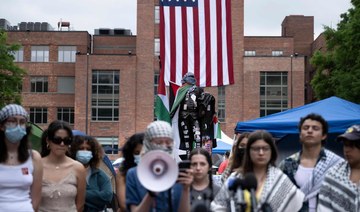MANILA: Philippine President Benigno Aquino III says three years of anti-corruption reforms have eradicated his country’s image as the “sick man of Asia” but he added he has lost patience over continuing problems such as large-scale smuggling and declared a tougher crackdown against wrongdoing in government.
In his state of the nation address that lasted for nearly two hours, Aquino listed his administration’s achievements midway through his six-year term, including a looming peace deal with the largest Muslim guerrilla group in the country’s volatile south.
But critics demanded that more be done to battle poverty, unemployment and crime.
Police said at least 15 people were hurt when anti-riot squads briefly clashed with thousands of protesters demanding jobs and land for poor farmers outside the heavily guarded House of Representatives, where Aquino spoke.
Aquino, whose mother was the late democracy icon and president, Corazon Aquino, and whose father was a slain senator who fought dictator Ferdinand Marcos, won the presidency in 2010 on a promise to battle corruption and poverty following two corruption-tainted predecessors.
Amid a period of lethargic global economic activity, Aquino said the Philippine economy grew 6.8 percent last year then surged 7.8 percent in the first quarter of this year, outpacing many Asian neighbors. Standard and Poor’s and Fitch Ratings earlier this year upgraded the Philippines’ credit rating to investment grade for the first time.
“Did anyone imagine that a country known as the ‘sick man of Asia’ would, within three years of good governance, reach investment grade status?” Aquino asked.
While his anti-corruption and other reforms have started to turn around the economy and arrest a feeling of national drift, Aquino acknowledged that corruption, incompetence and irregularities have continued in government, singling out the Bureau of Customs and two other agencies dealing with immigration and farm irrigation.
More than 200 billion pesos ($4.6 billion) is lost to smuggling each year, he said, adding Bureau of Customs personnel “are trying to outdo each other’s incompetence” and have failed to stop the entry even of smuggled drugs and guns.
“Where do these people get the gall?” Aquino asked. “One can almost hear them say, ‘I don’t care if the weapons go to criminal elements; I don’t care how many lives are ruined by drugs; I don’t care if our fields remain barren forever; What matters is that I am rich; it’s every man for himself.’“
Aquino said his patience has run out. “You were given three years to demonstrate your readiness to change. Now, I shall pursue all of you and hold you accountable.”
Philippine leader loses patience over corruption
Philippine leader loses patience over corruption

EU states push for June start to Ukraine membership talks
At a meeting in Brussels, France’s EU affairs minister Jean-Noel Barrot called for “the effective opening of negotiations“
BRUSSELS: Several EU countries on Tuesday called for the bloc to start membership negotiations with Ukraine and Moldova in June, but Hungary threatened to throw a spanner in the works.
The 27-nation EU took the landmark step in December of agreeing to open talks on its war-torn neighbor — and fellow ex-Soviet state Moldova — joining the club.
But to actually begin the negotiations the bloc’s member states still have to sign off on a formal framework for the process, proposed in March by Brussels.
At a meeting in Brussels, France’s EU affairs minister Jean-Noel Barrot called for “the effective opening of negotiations” before Belgium’s rotating presidency concludes at the end of June.
That statement was echoed by other ministers — including from Ireland and Sweden.
The push to move Ukraine onto the next step in its quest for EU membership comes amid fears that Hungary, the friendliest country with Moscow in the bloc, could stall progress when it takes over the presidency after Belgium.
Budapest has been hostile to Kyiv’s bid to join, arguing that Ukraine is getting pushed ahead in the queue without meeting the required criteria.
“There can be no exception on the basis of political or ideological considerations,” Hungarian minister Zoltan Kovacs said.
“There is very little, if any, progress. Again, I can repeat to you that membership, approval should be a merit based process. No exceptions.”
Another possible hurdle could come from a new right-wing government being formed in The Netherlands opposed to any new enlargement of the bloc.
Ukraine applied to join the EU shortly after Russia launched all-out invasion in February 2022.
Starting the negotiations would put Ukraine still only at the start of what is likely to be a years-long process of reforms before it can finally become a member.
Philippine island boasts world’s largest concentration of unique mammals

- 93% of mammals in Luzon are found nowhere else
- Island has higher biological diversity than Galapagos
MANILA: Luzon may be known as the largest and most populous island of the Philippines, but it is also home to the greatest concentration of unique mammal species on Earth. Most of them are found nowhere else in the world.
The island, where the Philippine capital Manila is located, had never been connected to any continental land. Throughout the ages, this allowed the species that arrived there from the Asian mainland to evolve, diversify, and thrive in different habitats of its mountain ranges and peaks isolated by lowlands.
It is also one of the oldest islands, with geological research indicating that parts of it have been dry land areas continuously for some 27 million years.
“It’s a really old island. So, there’s time for rare events to take place. That’s a big part of it,” Dr. Lawrence Heaney, biologist and curator of mammals at the Field Museum in Chicago, told Arab News.
“There are no countries in continental Europe that have (this number of) unique species of mammals.”
Heaney is one of the first researchers to document the island’s diversity and has been leading American and Filipino scientists studying mammals in the Philippines since 1981.
His team’s 15-year study, which started in 2000, concluded that there were 56 species of mammals — not including bats — on the island, and 52 of them were endemic.
This means that 93 percent of Luzon’s non-flying mammals are found nowhere else, making it a biological treasure trove.
Luzon beats even the Galapagos islands, where each has been known for its diverse and unique array of wildlife.
“Luzon takes it another step further because there are isolated mountain ranges and isolated mountain peaks that are separated from all others by lowlands. They function as islands. Islands in the sky. Each one of those islands in the sky has its own unique set of species. Luzon island is made up of islands within the island,” Heaney said.
“What’s in the northern Sierra Madre, you know Cagayan province ... is very different from what’s in the mountains that are in Aurora province, because there’s an area of lowlands that separates those two different mountain chains. Then the mountains, the next set of mountains down also are separated by another low-lying area ... There are species of mammals that occur there that don’t live anywhere else in the world.”
Many of those mammals are tiny — the size of the house mouse. When most people think about mammal species, they usually imagine those on the larger part of the spectrum, like themselves.
“We think about water buffalo and horses and lions and tigers and bears,” Heaney said. “There are actually very few large mammals, overwhelmingly, most mammals are small, less than 200 grams ... Not surprisingly, given that, most of the things that we have discovered that were previously unknown are small.”
Mariano Roy Duya, associate professor at the University of the Philippines’ Institute of Biology, who has been working with Heaney, told Arab News that 28 out of the 56 mammal species identified in Luzon were rodents.
Two of them — the Banahaw shrew rat and the Banahaw tree mouse — were endemic to Mt. Banahaw, which is only 100 km from Manila.
The Banahaw shrew-rat has a long, slender snout, a short tail, and weighs 150 grams, while the Banahaw tree mouse is the smallest member of the cloud rat family at 15.5 grams, and navigates tree branches and vines.
Their habitat is now protected due to the efforts of the Biodiversity Conservation Society of the Philippines, a group that was created thanks to the work of scientists like Heaney and Duya, who now serves as its vice president.
The society is an organization that the Philippine Department of Environment and Natural Resources consults on the country’s conservation efforts.
Some 20 percent of the species Heaney, Duya, and other researchers studied during their long Luzon project are vulnerable, endangered, or critically endangered due to habitat loss, hunting, and illegal wildlife trade.
“(These include) deer, warty pigs, cloud rats, flying foxes, cave-dwelling bats, and civets,” Duya said.
“According to the hunters we meet in the forest, these animals are becoming hard to find.”
Most of the threats to Luzon’s wildlife were observed in lowland forests, which are usually lost to human development, overlogging, conversion to agricultural fields, and trafficking.
“Close monitoring of illegal wildlife trade and regular enforcement activities should be a priority,” Duya said.
“Securing these forests, as well as forest fragments, will provide refuge to many of these endemic faunae.”
Germany: ICC asking for arrest warrants for Hamas leaders is logical

- “The accusations of the chief prosecutor are serious and must be substantiated,” said the spokesperson
BERLIN: A request by the International Criminal Court (ICC) for arrest warrants for Hamas leaders is logical and no comparisons can be made with Israel’s prime minister and defense minister, for whom warrants are also being sought, a German government spokesperson said.
“The accusations of the chief prosecutor are serious and must be substantiated,” said the spokesperson on Tuesday. He added that Germany assumed Israel’s democratic system and rule of law with a strong, independent judiciary would be taken into account by judges deciding whether to issue the warrants.
Indonesia, UAE to build mangrove research center in Bali

- Countries are part of Mangrove Alliance for Climate launched at COP27
- Southeast Asian country is home to about 23% of global mangrove ecosystems
JAKARTA: Indonesia and the UAE are collaborating to build a mangrove research center in Bali as part of a partnership to promote nature-based solutions to climate change.
The Southeast Asian country is home to about 23 percent of all mangrove ecosystems in the world. In the face of climate change, mangroves are essential in protecting coastal communities against rising sea levels and capturing massive amounts of emissions and greenhouse gases from the atmosphere.
At COP27, the 2022 UN climate summit held in Egypt, the archipelagic country partnered with the UAE to launch the Mangrove Alliance for Climate, an initiative focused on nature-based efforts to address issues related to climate change. It was later joined by dozens of other countries, including Australia and India.
As part of that cooperation, the two countries will start building an international mangrove research center in Bali, following a groundbreaking ceremony held over the weekend.
“This institution represents one of the UAE’s most important contributions in its partnership with Indonesia to promote nature-based solutions to address impacts of climate change in the two countries and in the world,” UAE Minister of Climate Change and Environment Dr. Amna bint Abdullah Al-Dahak said in a statement on Tuesday.
“Taking into consideration the significant decline of mangrove forests in the world, the UAE is aware that losing even more mangrove trees will worsen the impacts of climate change … this research center will work to create solutions.”
Al-Dahak attended the ceremony alongside Suhail Mohamed Al-Mazrouei, a special envoy of the UAE president, and Luhut Binsar Pandjaitan, Indonesia’s coordinating minister of maritime affairs and investment.
According to Indonesia’s Maritime Affairs and Investment Ministry, the center will focus on conducting research, conservation and providing education related to mangroves, particularly on harnessing biotechnology and innovative uses of artificial intelligence to identify and restore mangrove ecosystems.
“I’m proudly announcing that the International Mangrove Research Center will be built in a strategic location in Bali, which has already shown its success in preserving mangrove ecosystems and will garner international attention,” Pandjaitan said.
Indonesia has made mangrove planting a key feature in the international events that it hosts, including the Group of 20 Meeting in 2022 and the 10th World Water Forum, which runs until May 25. The research center will be built within the Ngurah Rai Forest Park, Bali’s largest mangrove conservation area covering about 1,300 hectares.
Police break up pro-Palestinian camp at the University of Michigan

- Video posted online by Detroit-area TV stations showed police moving people away from the camp on the Diag, a common site for campus protests
- The encampment had been set up in late April near the end of the school year
MICHIGAN: Police broke up a pro-Palestinian encampment Tuesday at the University of Michigan, less than a week after demonstrators showed up at the home of a school official and placed fake body bags on her lawn.
Video posted online by Detroit-area TV stations showed police moving people away from the camp on the Diag, a common site for campus protests. The encampment had been set up in late April near the end of the school year.
President Santa Ono said in a statement that the encampment had become a threat to safety, with overloaded power sources and open flames. Organizers had refused to comply with requests to make changes following an inspection by a fire marshal, he said.
“The disregard for safety directives was only the latest in a series of troubling events,” Ono said.
Protesters have demanded that the school’s endowment stop investing in companies with ties to Israel. But the university insists it has no direct investments and less than $15 million placed with funds that might include companies in Israel. That’s less than 0.1 percent of the total endowment.
“There’s nothing to talk about. That issue is settled,” Sarah Hubbard, chair of the Board of Regents, said last week.
A group of 30 protesters showed up at her house before dawn last week and placed stuffed, red-stained sheets on her lawn to resemble body bags. They banged a drum and chanted slogans over a bullhorn.
Masked protesters also posted demands at the doors of other board members.
“This conduct is where our failure to address antisemitism leads literally — literally — to the front door of my home,” board member Mark Bernstein, a Detroit-area lawyer, said at a board meeting last week. “Who’s next? When and where will this end? As a Jew, I know the answer to these questions because our experience is full of tragedies that we are at grave risk of repeating. Enough is enough.”
Students and others have set up tent encampments on campuses around the country to press colleges to cut financial ties with Israel. Tensions over the war have been high on campuses since the fall, but demonstrations spread quickly following an April 18 police crackdown on an encampment at Columbia University.
















